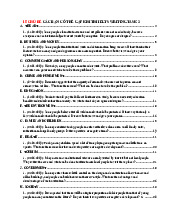


Preview text:
Sample Academic Reading Multiple Choice (more than one answer)
[Note: This is an extract from a Part 1 text about older people in the workforce.]
© The Economist Newspaper Limited, London, 1999
Clearly, when older people do heavy physical work, their age may affect their productivity.
But other skills may increase with age, including many that are crucial for good management,
such as an ability to handle people diplomatically, to run a meeting or to spot a problem
before it blows up. Peter Hicks, who co-ordinates OECD work on the policy implications of
ageing, says that plenty of research suggests older people are paid more because they are worth more.
And the virtues of the young may be exaggerated. ‘The few companies that have kept on
older workers find they have good judgement and their productivity is good,’ says Peter
Peterson, author of a recent book on the impact of ageing. ‘Besides, their education
standards are much better than those of today’s young high-school graduates.’ Companies
may say that older workers are not worth training because they are reaching the end of their
working lives; in fact, young people tend to switch jobs so frequently that they offer the worst
returns on training. The median age for employer-driven training is the late 40s and early
50s, and this training goes mainly to managers.
OECD: Organisation for Economic Co-operation and Development Questions 1 and 2
Choose TWO letters, A-G.
Write the correct letters in boxes 1 and 2 on your answer sheet.
The list below gives some of the advantages of employing older workers.
Which TWO advantages are mentioned by the writer of the text? A
They are less likely to be involved in careless accidents. B
They can predict areas that may cause trouble in the future. C
They are able to train younger workers. D
They can deal with unexpected problems. E They are more conscientious. F
They are prepared to work for lower salaries. G
They are more skilled in personal relationships. Questions 3 and 4
Choose TWO letters, A-F.
Write the correct letters in boxes 3 and 4 on your answer sheet.
The list below gives some of the disadvantages of employing younger workers.
Which TWO disadvantages are mentioned by the writer of the text? A
They are too confident of their own skills. B They may injure themselves. C
They do not stay with the same company for very long. D
Their training has been too theoretical. E
They are not as well educated as older workers. F They demand higher salaries.
Sample Academic Reading Multiple Choice (more than one answer) Answers 1&2 IN EITHER ORDER B ■ They can pre i d ct areas that ma y cause trou l b e in th e future G ■ They are more skille d in p r e sonal relationship s 3&4 IN EITHER ORDER C ■ They do not sta y with th e same compan y for very lo g n
E ■ They are not as well educated a s older workers




